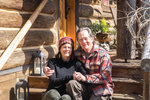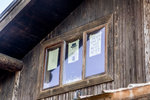

Like with so many others, it started with a dry cough.
Betsy Stowater, a 66-year-old Port Townsend woman, described her first symptoms of the coronavirus as similar to allergies.
“It was just an allergy type of cough,” she said. “A dry cough with a runny nose.”
She began to notice these somewhat minor symptoms on March 11. If it were any other year, she would have assumed she had a cold. But with their eyes on the news, Betsy and her husband Jon began to wonder if she should get tested.
“By then, things were ramping up in China and the virus was moving to Europe,” Jon said. “We heard about the cases in Kirkland, and I said, ‘Maybe you ought to get this checked out.’”
By March 18, the symptoms worsened dramatically.
“Things deteriorated quickly,” she said. “I have never been sick like this before. Ever.”
Some symptoms are comparable to the flu, she said, such as the aches and pains, as well as the fever and chills. But flu symptoms are pretty consistent, she added. For her, the coronavirus was a roller coaster ride of sickness.
After calling Jefferson Healthcare’s COVID-19 hotline and speaking to a few nurses and doctors, Stowater had an appointment to be tested on March 20.
“We drove up to the respiratory clinic and out walked a nurse in a big white space suit and space helmet,” Jon said. “They looked like the Michelin man with all the protective gear on.”
The healthcare workers asked Jon to stay in the car as Betsy went into the clinic to be tested.
“The care was wonderful,” she said. But the test was expectedly uncomfortable, she added. A long Q-tip swab went up one of her nostrils to send a sample to the state lab for coronavirus testing. Another long Q-tip swab went up her other nostril to test for the flu. And finally, doctors took a chest X-ray.
The flu and the chest X-ray tests came back negative first.
“I had the test on Friday and the following Saturday and Sunday I felt much, much worse,” she said. “It didn’t surprise me at all when the doctor called me up that Monday and told me the results.”
Betsy Stowater was the 10th confirmed case of coronavirus in Jefferson County.
Because of patient confidentiality, Jefferson County Public Health will not confirm the names of those who have tested positive. There have been 27 confirmed cases in the county. Eighteen have been determined to be in-county transmission.
Over the next few weeks, Betsy experienced some of the worst sickness she has ever known, with waves of exhaustion, the inability to breathe, and eventually the complete loss of her sense of smell and taste. But the symptoms of the novel coronavirus went beyond physical, making her feel isolated and alone, wading into the unknown territory of a novel virus.
“It’s like you have no control over what’s going on in your body,” she said. “It was scary because I really felt sure I had it, even before I went in for the test. I had just never felt like this before.”
Stowater had not traveled outside Jefferson County in weeks. A retired special education teacher, she and her husband live near the North Beach community of Port Townsend.
Normally, Betsy’s days are full of volunteer work and classes. Over the past year, she has been involved with the Recovery Cafe project, working to build a community to aid those in recovery from addiction. She volunteers with Dove House Advocacy Services and helps at the homeless shelter. She and Jon take music and art classes in their free time.
In the weeks leading up to her illness, Betsy stayed in town, only traveling to Whidbey Island once. If she had to hazard a guess, she would say she must have picked up the virus from someone who visited Port Townsend from outside of the county since she had not been to any affected areas in the past month.
By the time her volunteer meet-ups and classes were beginning to get canceled or move online to stop the spread of the virus, it didn’t really matter for Betsy. She was too sick to do anything anyway.
“Everything got crossed off the calendar,” she said. “And then once I got sick, there was no more contact with anyone anymore.”
Betsy Stowater and her husband have been in quarantine since she got sick.
“Fortunately Betsy had been pretty proactive,” Jon said. “When the news started to indicate the virus was coming to the U.S., she had gone to the store and stocked up on food and hand cleaner. She made a lot of soup and we were well prepared.”
The Stowater’s neighbors were also supportive throughout the quarantine, picking food up and dropping it off in their driveway.
To keep neighbors updated and entertained, Jon, who has been taking cartooning classes online from Port Townsend School of the Arts, drew large cartoons and put them in the window of the Stowater’s home for passersby to see.
Over the days and weeks, Betsy’s symptoms changed.
Betsy regularly goes swimming, and describes herself as healthy, with no complications. She doesn’t smoke, eats healthy food and exercises regularly. Yet the symptoms still hit her hard.
“There was one moment when I was talking on the phone with one of my neighbors and I just had to hand the phone to my husband,” she said. “I just had to get off immediately because I couldn’t breathe.”
A few days later, she experienced a burning smell in her nose. Then, she realized she couldn’t smell or taste.
“I actually cooked up some garlic in olive oil to test it out,” she said. “What was scary was that I didn’t know if I would get it back, and the doctors didn’t know either.”
She couldn’t smell or taste for eight days, before finally being able to taste really salty or sweet things, like chocolate.
Beyond the symptoms, she also felt totally alone at times.
“I didn’t know who else in the county had it,” she said. “I didn’t have anyone to talk to, to see if they were experiencing the same things.”
She had to stop watching the news—especially the stories that were similar to hers but that ended badly.
“It was scary because I didn’t know if I was going to make it at times,” she said. “You read about all these healthy, young people dying from this. All the doctors and nurses who are getting sick. I wondered, why are they dying and why am I not in the hospital?”
Washington state has a 4.2% death rate from the coronavirus. Across the world, more than 80,000 people have died.
Trying to stay positive, Betsy made sure to get lots of Vitamin C. She ate soup, even though she had no appetite. She would try to read or watch TV at times, even though she had little energy. She would sit in the sun, to warm her face and chest.
“It was very frustrating,” she said. “You have zero energy to do anything. I didn’t even feel like reading, and I love to read.”
By March 31, Betsy finally felt good enough to cook dinner. But the waves of exhaustion still come and go. She doesn’t know how long it will take before she is back to normal. And she doesn’t know if she will be immune to the virus.
Amazingly, Jon did not get any virus symptoms, despite living in close quarters with Betsy.
“It was a little surprising living right here in close proximity all this time with her,” he said. “Maybe I am one of those who is asymptomatic and I do actually carry it. Since there is such a shortage in tests, I may never know.”
If there’s one thing Betsy wants anyone experiencing coronavirus to know, it’s that they aren’t alone.
“I wish we had a hotline or something,” she said. “To let people know that you are not alone and that it is possible to get through this if you rest.”
People should be prepared for two weeks or more of quarantine along with dramatic symptoms like Betsy Stowater experienced.
She recommends having a heating pad and a thermometer—if you can get your hands on one.
“People who are COVID-positive should not leave their houses,” said Tom Locke, Jefferson County’s public health officer. “Family members who have been exposed to them (and thus are in quarantine) should also not leave the house. They should have groceries delivered or brought to the home by friends or non-quarantined family members.”
While hoarding food is discouraged, it is fine to have a two- to three-week supply of food at home, he said.
While Jon might have been lucky, families should avoid sharing personal items, such as dishes, drinking glasses, cups, utensils, towels or bedding with people who might be sick.
For anyone who might be sick, Betsy recommends getting outside in the sun and steamy showers to help with the tightness in the chest.
“Look outside and enjoy the beauty outside,” she said. “That helped me. Call someone to get the support you need to get through this, even if it’s just a short conversation.”
If you feel like you might have symptoms, call the COVID-19 hotline: 360-394-3094.
And as more of our neighbors and friends get sick, rely on each other for help.
“Our neighbors have been so supportive,” Jon said. “Betsy had some really bad symptoms. But we’re very fortunate she never had to go to the hospital.”